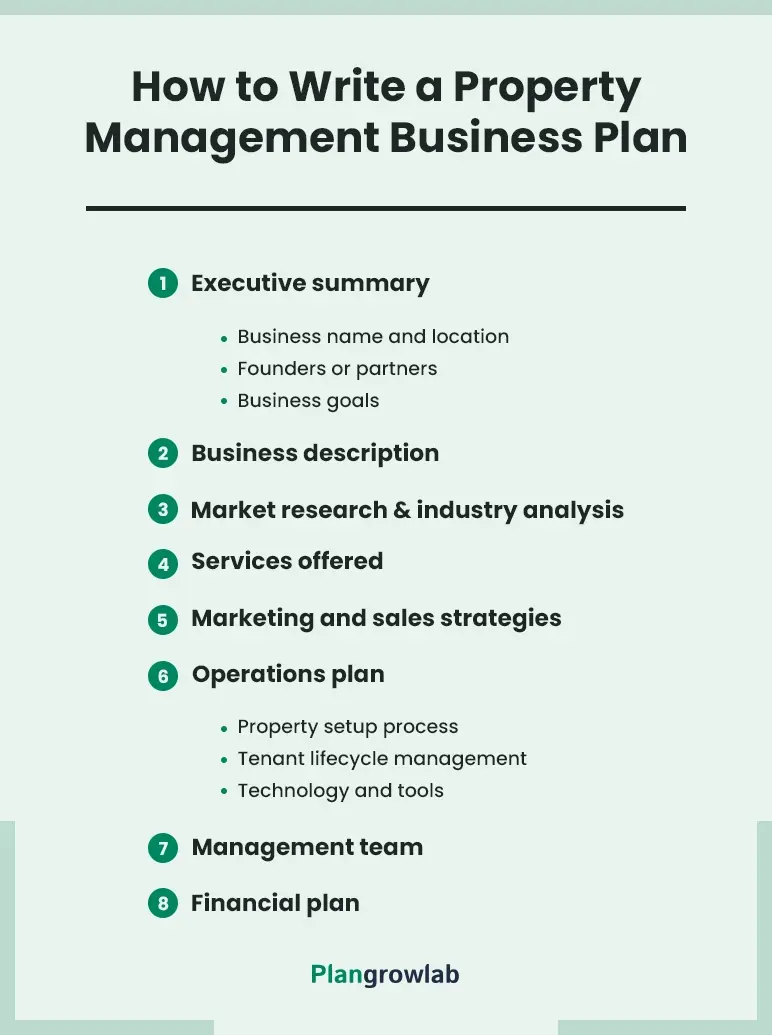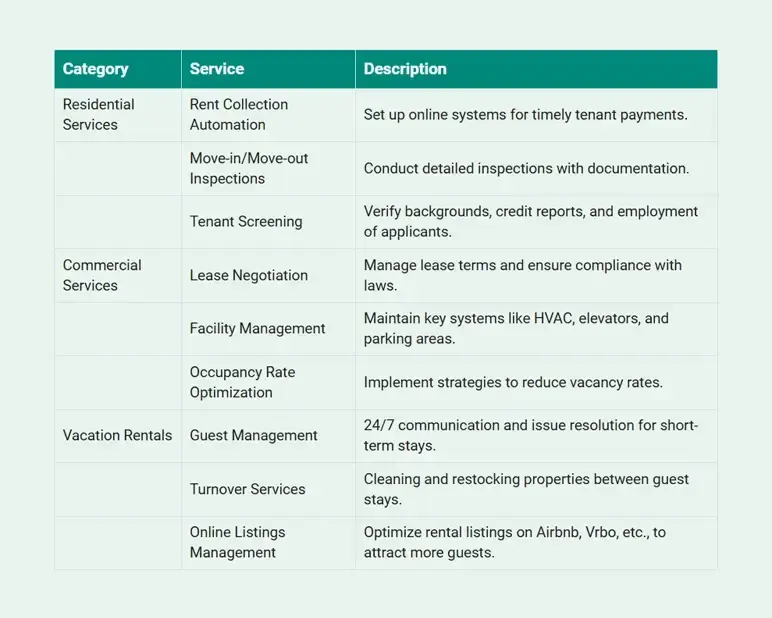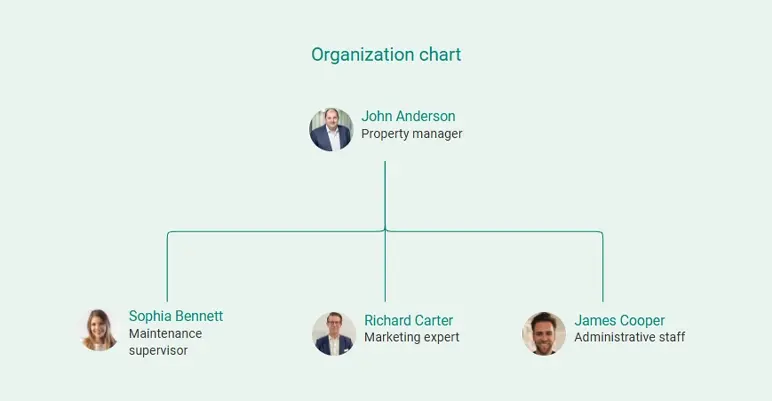Creating a business plan can be a big task for new-age entrepreneurs. And Matthew Garfield-Smith, the Property Manager at Digs Bristol, experienced this firsthand while turning his real estate skills into reality.
In fact, I recently had a chat with Matthew about how he overcame hurdles and established a trusted business that supports both property owners and tenants.
From our conversation, I’ve created this step-by-step guide to help you craft a practical and effective property management business plan with confidence.
Who do you need a property management business plan?
A property management business plan is more than just a formal document—it’s a strategic guide that helps transform your business idea into a profitable venture. Here’s why it’s crucial:
- It helps clarify your goals, whether you're focused on managing one property or aiming to grow a portfolio of multiple units.
- Appeals to potential investors or lenders, showing them that you have a clear vision and a structured approach.
- Allows you to predict potential challenges and risks, helping you develop proactive strategies to handle them.
- Serves as a valuable tool to monitor your progress, assess strategies, and make adjustments as needed.
Ultimately, keeping a solid property management business plan is vital for steering your business toward long-term success.
How to write a property management business plan
Creating a business plan for property management involves outlining several key sections that clearly explain your goals, vision, and strategies in a simple and organized way. Here’s a step-by-step guide:

1. Executive summary
An executive summary is like a short introduction to your property management business plan. It gives a quick overview of what your property management firm is all about and what makes it stand out.
Even though it's the first section of your plan, it’s best to write it last. Because completing other sections helps you summarize all the important elements easily.
Here’s what to include in your property management plan summary:
- Business name and location
- Founders or partners
- Business goals
- Market opportunities
- Unique features
- Financial highlights
The goal of your executive summary is to grab the reader's attention and leave a great first impression. Hence, make it short, clear, and interesting, so it summarizes the most important parts of your property management business.
"Writing the executive summary for my property management business plan was harder than I expected.
It’s supposed to be short and straight to the point, but packing in all the key details without making it feel rushed or vague took some work.
It forced me to figure out how to explain what my business does and why it’s different—without sounding like every other property management company out there.”—Matthew Garfield-Smith
2. Business description
This section clearly outlines who you are and what your property management company is about. It’s your chance to explain your business in more detail.
While planning this section, consider answering a few questions like:
- What’s the main goal of your property management business, and where do you see it going in the future?
- Do you manage multi-unit, commercial, or residential properties?
- Are you a sole proprietor, a limited liability company (LLC), or a partnership?
- What’s the purpose of your business, and what values guide it?
- How did you get started? Share the story behind your business and how it came to life.
- What successes or milestones have you reached up to now?
Also, don’t forget to mention any regulatory requirements or legal rules for property management businesses, and how you plan to follow them.
In short, this section gives readers a clear picture of your business and helps build trust in what you do. Keep it simple, real, and focused on what matters most.
"When it came to the legal structure, I spent more time than I expected figuring out whether to go with an LLC or something else.
In the end, I chose an LLC because it protected my personal finances and made taxes easier to handle. It also gave investors some peace of mind knowing we were structured properly from the start"—Matthew Garfield-Smith
3. Market research and industry analysis
It's essential to conduct market research, which would help you know the property management industry and the local real estate market so well.
This will also indicate to the investors or partners that you’ve done your homework and that you have a good strategy for positioning your business for success.
To make this section effective, be sure to include these elements:
- Size of the property management industry
- Your target market
- Potential clients and their specific needs
- Current and emerging market trends
- Key competitors (other property management businesses)
Knowing your target market helps you make well-informed decisions, meet client expectations, and stay one step ahead of the competition.
"At first, it felt overwhelming to analyze competitors because there were so many other property management companies already in the game.
I decided to make a simple comparison chart to track their services, pricing, and reviews. That’s when I started seeing gaps—things like poor customer service reviews or outdated systems for payments and maintenance requests.
I used those weak spots to show how my business could do better and stand out."—Matthew Garfield-Smith
4. Services offered
Now, focus on highlighting your property management services. Be clear about what your business does and how you provide value to property owners, tenants, and investors.
Start by listing the specific services your property management business intends to offer. These might include property maintenance, tenant screening, rent collection, and handling legal and financial matters for property owners.
Here are a few property management services you might cover:

If applicable, include additional services like marketing vacant properties, providing consulting for investment strategies, or offering short-term rental management options.
Lastly, make sure to outline your pricing strategy, clearly explaining how you charge for your services, whether it’s a flat fee, percentage-based, or customized depending on the service package.
"While listing the property management services, it felt like I had to list everything we could possibly do, but I quickly realized that trying to offer too much could make the business look unfocused.
So, I shifted my focus to highlighting the services that added the most value and solved real problems for property owners."—Matthew Garfield-Smith
5. Marketing and sales strategies
Property management involves much more than just maintenance; it's also about securing reliable tenants and keeping them satisfied to ensure long-term success.
So, you have to create effective strategies and methods to promote your properties. Here are several sales tactics and marketing tactics you may consider:
- Develop an SEO-friendly website to show your services online and get noticed.
- Share social media posts and Google Ads to reach more people.
- Partner with other local businesses to get more clients.
- Introduce loyalty programs or offer referral rewards to keep customers coming back.
- Attend local events to network and build relationships with potential clients.
This section showcases your approach to growing your client base (both property owners and tenants) and maintaining their trust. Be prepared to adapt and refine your methods based on market trends and feedback.
"When starting out, attracting potential clients through traditional marketing strategies didn’t feel natural.
We shifted towards building an online presence and tailoring our services, like tenant acquisition plans, to local trends.
Also, focused efforts on competitive rental rates and streamlining the tenant screening process were vital for acquiring the right clients."—Matthew Garfield-Smith
6. Operations plan
Next, explain how your property management business will run on a daily basis and what steps you’ll need to take to achieve your goals.
A well-written operations plan shows how you’ll handle the key tasks and responsibilities of managing properties. So, make sure to include:
- Property setup process: Steps for onboarding new properties into your management system.
- Tenant lifecycle management: Your approach to tenant screening, leasing, communication, and renewals or move-outs.
- Maintenance and issue handling: How you’ll manage routine upkeep, emergency repairs, and contractor relationships.
- Technology and tools: Property management software and systems are used to track payments, leases, and maintenance requests for efficiency.
- Staffing and support: Key roles and responsibilities needed for day-to-day operations, whether in-house staff or third-party support.
By addressing these aspects, you’ll show clients and partners that you’re ready to run your property management business effectively every day.
"I wanted to ensure the daily operations were simple and effective. Having a property management software system in place for tracking payments, leases, and communication made a huge difference.
It helped smooth the onboarding of new properties and ensured my team could address client concerns quickly and efficiently."—Matthew Garfield-Smith
7. Management team
This section focuses on the most important members of your management team who will propel your property management business to success.
Even if you run the business by yourself, you will still need to list your relevant experience and skills as a way to demonstrate your capabilities to potential clients or investors within the property management industry.
If you have a team, you need to introduce them here. It might include property managers, maintenance supervisors, marketing experts, and administrative staff. Explain their role, qualifications, skills, and experience.
Further, you can add an organizational chart that visually explains the structure of your team and the work they are expected to perform. For example:

If applicable, mention the external collaborators: legal advisors, accountants, or contractors. Describe how they will help in the business.
Overall, this section builds trust and demonstrates that you have a good basis for running a successful property management business.
"Although it was just me in the beginning, demonstrating my experience and knowledge within the property management business made a significant impact when pitching my business.
Over time, as my team grew, I added key maintenance staff, administrative help, and other collaborators like legal advisors to support daily operations.
Highlighting their skills and roles in the management team section gave investors confidence."—Matthew Garfield-Smith
8. Financial plan
Your financial plan breaks down how your property management business is going to raise income, remain profitable, and mitigate potential risks.
This section is not significant only for encouraging investors and acquiring loans but also for checking the financial health and sustainability of the business for the long term run.
Provide financial projections for the next 3 to 5 years, including:
- Income statement (profit and loss statement)
- Cash flow statement
- Break-even analysis
- Balance sheet
Additionally, provide your start-up costs, revenue projections, and operating expenses. Clearly state how much funding you need and the sources for it.
Finally, identify potential financial risks, such as market fluctuations or unexpected costs, and include a risk management plan to show that your business is prepared to handle challenges effectively.
"Predicting revenue was a tricky part. Since income depends on how many properties you manage and the fees you charge, I had to be realistic about how quickly I could scale.
I started with conservative numbers—managing 10 properties in the first few months—and gradually increased the projections as the business grew.
This approach helped me avoid overpromising to investors while still showing growth potential."—Matthew Garfield-Smith
Download property management business plan template
Ready to create your property management business plan but need a little help? We’ve got you covered! Download our free property management business plan template in PDF and get started.
This simple and easy-to-use template has helped many property managers start their businesses. With practical examples and useful tips, it also helps you put together a plan that covers all the essential details you need.
Conclusion
After going through this guide, you now have a solid understanding of how to create a winning property management business plan and tackle challenges effectively.
If you’re still feeling unsure or need expert advice, don’t hesitate to contact our experienced business plan consultants.
Our team will help you with everything, starting from business plan writing and reviewing to providing tailored consulting services that meet your specific needs.
Don’t wait—get in touch with us today!
Frequently Asked Questions
How do I conduct market analysis for my property management business plan?
Consider following these steps to conduct detailed market analysis:
- Research the local rental market
- Define your target market and ideal customers
- Study indirect and direct competitors
- Analyze industry trends
- Highlight potential opportunities as well as challenges
What services should I include in my property management business plan?
In your property management business plan, include essential services like tenant screening, rent collection, property maintenance, marketing, financial management, and ensuring legal compliance. You can also highlight specialized services like short-term rental management or renovation coordination based on your target market’s needs.
How to get funding for your property management business plan?
To secure funding for your property management business, explore these options:
- Personal savings
- Bank loans
- Investors
- Government grants
- Crowdfunding platforms
Where to find a business plan consultant for your property management business?
You can find business plan consultants for your property management company on reputable platforms like PlanGrowLab, Fiverr, Upmetrics, Growthink, as well as Upwork.
How to create financial projections for a property management business plan?
To create financial projections, you need to:
- Estimate income from fees and services
- List costs like operations, marketing, and unexpected expenses
- Track cash flow to see inflows and outflows
- Project profits for 3-5 years
- Calculate when your business will reach a break-even point
How often should I update my property management business plan?
It’s a good idea to review your property management plan at least once a year or more often if your business expands or the industry changes significantly. Regularly updating your business plan will ensure your plan stays relevant, help you adapt to new opportunities, and keep you on track with your goals.

